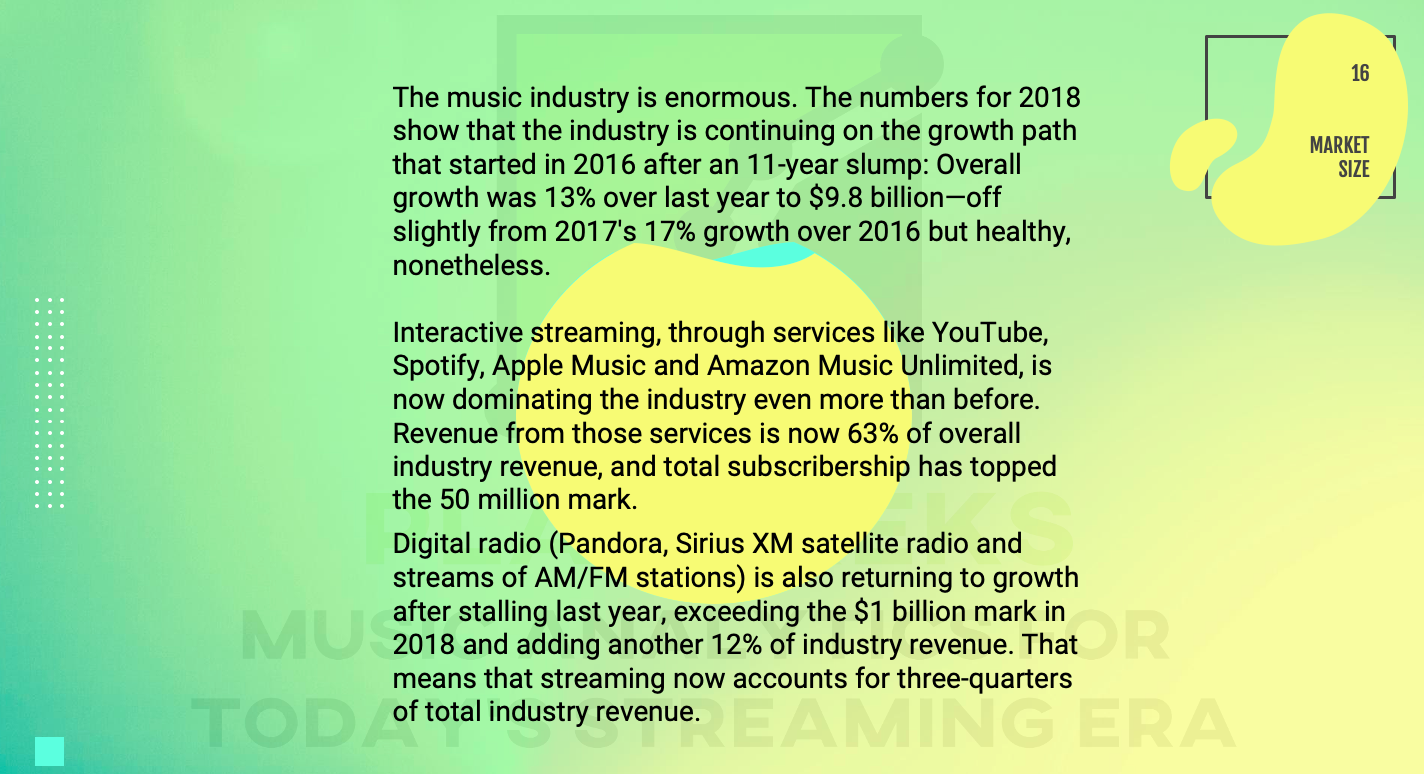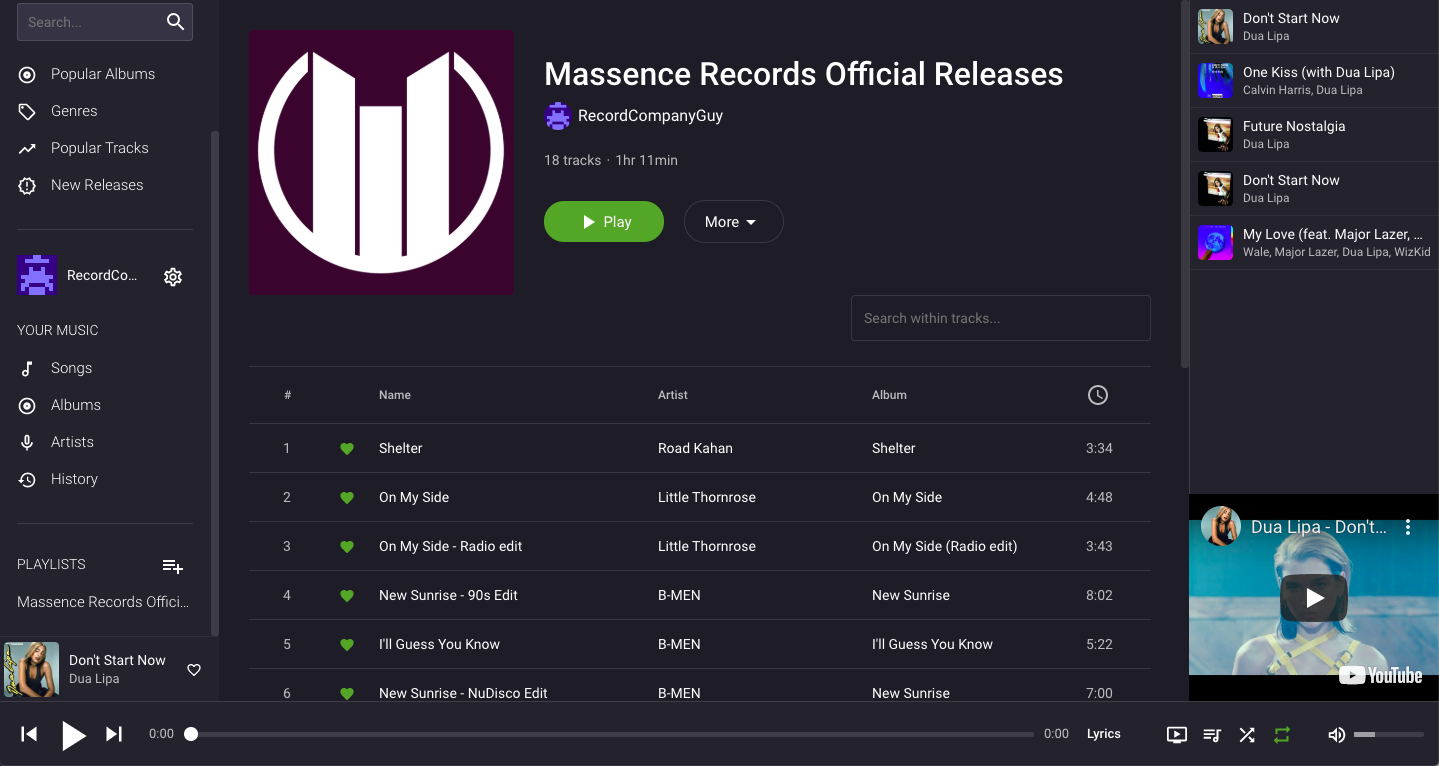Playtreks 1A
PlayTreks, the ultimate music discovery platform.
€54,700
total amount raised in round
109%
- Backed by over 70 investors
- Eligible for a tax reduction
Campaign Closed
Playtreks, the artificial intelligence marketing platform for artists, record labels, producers, artist managers and anybody who loves music!
The music industry is enormous. The numbers for 2018 show that the industry is continuing on the growth path that started in 2016 after an 11-year slump: Overall growth was 13% over last year to $9.8 billion—off slightly from 2017's 17% growth over 2016 but healthy nonetheless.

So how does the market Playtreks addresses look like?
A large focus area of PlayTreks will be the so called BEDROOM PRODUCERS. A bedroom producer is a musician who creates, performs, and records their music independently using a home studio, either as a profession or as a hobby. Typically bedroom producers use accessible digital technology that costs less than the equipment in a professional studio, such as MIDI controller-based instruments and virtual studio technology (software synthesized instruments and digital effects), to create music for release to the world.
While a traditional record producer oversees and guides the recording process, often working alongside multiple people such as studio musicians, singers, engineers, mixers, songwriters, arrangers, and orchestrators, a bedroom producer does everything independently: creating the ideas, recording them and processing them for release.
Bedroom producers are often self-taught, learning sound design, mixing and music theory by reading music production blogs and watching tutorials on the internet. As bedroom producers depend on the accessibility of music technology, bedroom production has been made easier with advances in home computing power and digital audio workstations (DAW).
There are millions of bedroom producers out there, so this is concretely a substantial market.
If only you know that close to 4 million individual "music creators" are hosted by Spotify alone, you can imagine there is a need and a huge potential for an affordable platform like PlayTreks!
A large focus area of PlayTreks will be the so called BEDROOM PRODUCERS. A bedroom producer is a musician who creates, performs, and records their music independently using a home studio, either as a profession or as a hobby. Typically bedroom producers use accessible digital technology that costs less than the equipment in a professional studio, such as MIDI controller-based instruments and virtual studio technology (software synthesized instruments and digital effects), to create music for release to the world.
While a traditional record producer oversees and guides the recording process, often working alongside multiple people such as studio musicians, singers, engineers, mixers, songwriters, arrangers, and orchestrators, a bedroom producer does everything independently: creating the ideas, recording them and processing them for release.
Bedroom producers are often self-taught, learning sound design, mixing and music theory by reading music production blogs and watching tutorials on the internet. As bedroom producers depend on the accessibility of music technology, bedroom production has been made easier with advances in home computing power and digital audio workstations (DAW).
There are millions of bedroom producers out there, so this is concretely a substantial market.
If only you know that close to 4 million individual "music creators" are hosted by Spotify alone, you can imagine there is a need and a huge potential for an affordable platform like PlayTreks!
Besides the bedroom producers, there are at least 25000 record labels out there, of which the most known to the public are SONY, Warner and Universal.
Talking about these three major labels, in 2017, according to a report backed by the U.S. music trade group RIAA, major record companies signed a total of 658 acts— a number up 12 percent over 2014. In 2019, that figure (judging by the subsequent launch of additional frontline record companies at Warner Music and Sony Music) must have grown yet again.
Even at its 2017 level, it suggests that the major record companies — across Universal, Sony and Warner — are signing somewhere close to an average of two artists every day. Globally, those same record companies spent $4.1 billion on A&R (the money required to sign artists, and to develop and record their music) in the same year.
This works out at approximately $11 million per day.
Just to run that by you again: $11 million being spent every 24 hours, to sign nearly two artists a day, or more than 50 artists each month.
Talking about these three major labels, in 2017, according to a report backed by the U.S. music trade group RIAA, major record companies signed a total of 658 acts— a number up 12 percent over 2014. In 2019, that figure (judging by the subsequent launch of additional frontline record companies at Warner Music and Sony Music) must have grown yet again.
Even at its 2017 level, it suggests that the major record companies — across Universal, Sony and Warner — are signing somewhere close to an average of two artists every day. Globally, those same record companies spent $4.1 billion on A&R (the money required to sign artists, and to develop and record their music) in the same year.
This works out at approximately $11 million per day.
Just to run that by you again: $11 million being spent every 24 hours, to sign nearly two artists a day, or more than 50 artists each month.
